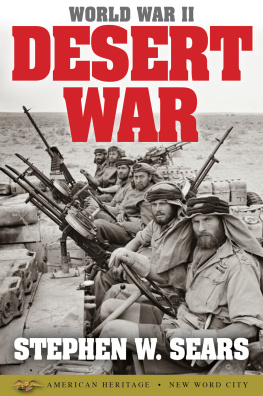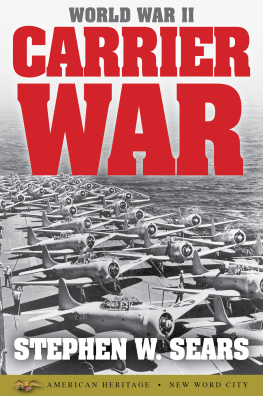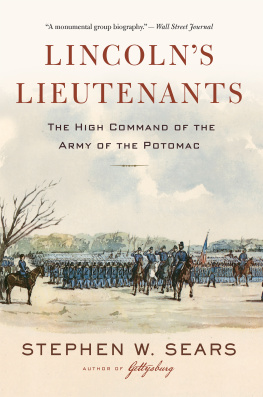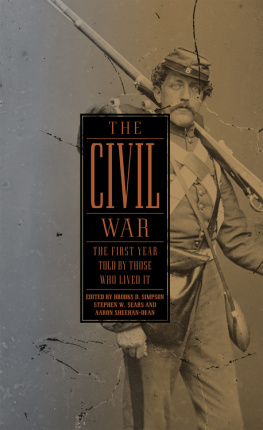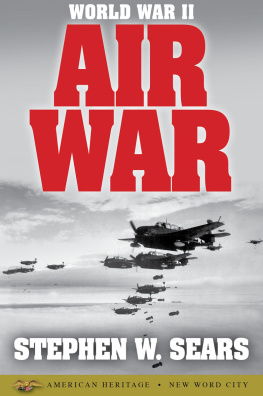Stephen W. Sears - Desert War: World War II
Here you can read online Stephen W. Sears - Desert War: World War II full text of the book (entire story) in english for free. Download pdf and epub, get meaning, cover and reviews about this ebook. year: 2014, publisher: New Word City, Inc., genre: History. Description of the work, (preface) as well as reviews are available. Best literature library LitArk.com created for fans of good reading and offers a wide selection of genres:
Romance novel
Science fiction
Adventure
Detective
Science
History
Home and family
Prose
Art
Politics
Computer
Non-fiction
Religion
Business
Children
Humor
Choose a favorite category and find really read worthwhile books. Enjoy immersion in the world of imagination, feel the emotions of the characters or learn something new for yourself, make an fascinating discovery.
- Book:Desert War: World War II
- Author:
- Publisher:New Word City, Inc.
- Genre:
- Year:2014
- Rating:3 / 5
- Favourites:Add to favourites
- Your mark:
- 60
- 1
- 2
- 3
- 4
- 5
Desert War: World War II: summary, description and annotation
We offer to read an annotation, description, summary or preface (depends on what the author of the book "Desert War: World War II" wrote himself). If you haven't found the necessary information about the book — write in the comments, we will try to find it.
Desert War: World War II — read online for free the complete book (whole text) full work
Below is the text of the book, divided by pages. System saving the place of the last page read, allows you to conveniently read the book "Desert War: World War II" online for free, without having to search again every time where you left off. Put a bookmark, and you can go to the page where you finished reading at any time.
Font size:
Interval:
Bookmark:
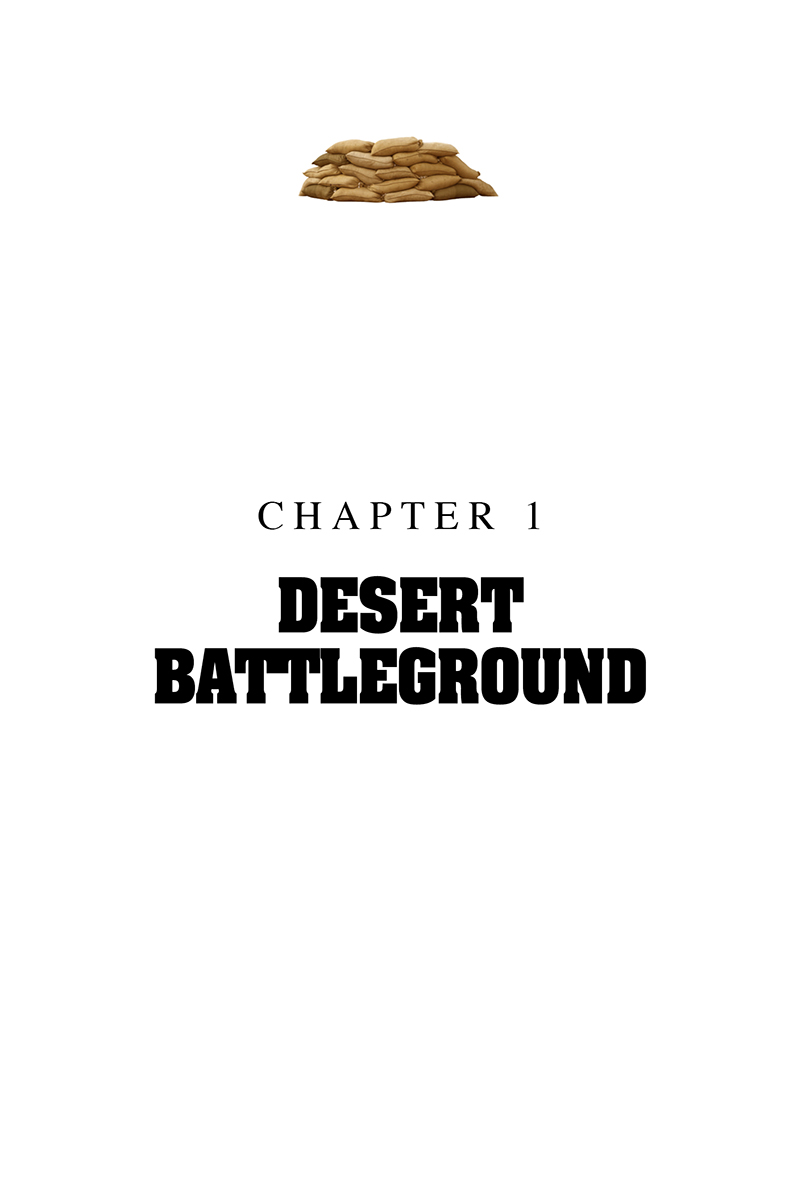
Marshal Rodolfo Graziani , governor general of the colony of Libya, commander of the Italian 10th Army, was unhappy as he read his new orders. They came from Italys head of state, Benito Mussolini , and they were blunt: Attack within two days or face dismissal. Graziani was an impressive figure, full-fleshed and handsome, with silver hair and a noble profile, but he was far less confident than he looked. He believed to attack now in the North African desert would be to court defeat, and defeat in the desert, he warned, would inevitably develop into a rapid and total disaster.
As Graziani saw it that September day in 1940, Italy was not prepared for war, certainly not war in North Africa. He knew what desert fighting was like. Before World War II , he had led a campaign to conquer the Senussi , a tribe of Arabs rebelling against Italian rule in Libya, and the experience had been a sobering one. The desert was barren, featureless, and all but waterless. The difficulties of keeping an army supplied were staggering. Desert fighting imposed its own special rules, which Graziani suspected his 10th Army had not yet learned.
All summer long he had been badgered to take the offensive. In June 1940, Mussolini dragged Italy into World War II to pick up the spoils of victory and revive the glories of ancient Rome . Egypt, with her fertile Nile delta, her storied cities of Alexandria and Cairo, her famous Suez Canal , seemed to promise both. Push aside the small British army stationed there, said il Duce, and the prize will fall like a ripe plum; Graziani had 250,000 soldiers in Libya, surely enough for the job. By July, Mussolini was writing Adolf Hitler , his fellow dictator in Germany, that preparations for an attack on Egypt with vast objectives are now complete. As an observer remarked, From a balcony in Rome, it looked easy.
Part of Grazianis reluctance to attack came from his cautious nature, part from shortages of the essentials of desert warfare (trucks, tanks, and antitank guns), and part from a healthy respect for his British opponents. While Mussolini harassed him from long distance, General Sir Archibald Wavell s Western Desert Force snapped at him from close range.
Hardly had Italy declared war before fast-moving British columns of tanks, armored cars, and artillery seized the Italian forts guarding the Egyptian-Libyan frontier. A few days later, a well-armed Italian scouting force was ambushed and almost wiped out, losing seventeen tanks, a battery of field artillery, and some 100 men killed or captured; the British suffered no casualties at all. These hit-and-run raids continued through the summer. By September, Graziani had lost 3,500 men and Mussolini his patience. From Rome came the order to attack.
On September 13, 1940, Grazianis 10th Army heaved itself into motion at Sidi Omar, its advance base near the Egyptian frontier. For four days, it rumbled eastward along the coast road that runs parallel with the Mediterranean. Motorcyclists led the way, backed up by swarms of tanks and assault guns. Infantry followed in an endless procession of trucks. A small British rear guard fell back, persistently shelling the advancing Italians. At Sidi Barrani, a cluster of dusty, whitewashed mud huts sixty-five miles inside Egypt, Graziani halted and began building elaborate defenses. For the time being, at least, his offensive was over.
The 10th Army came to a stop on September 16. For nearly three months, it made no further threatening moves. Graziani busied himself digging his army into a chain of fortified desert camps that stretched fifty miles south from Sidi Barrani. General Wavell spent the three months stockpiling supplies and sharpening his plans.
Archibald Wavell was square-jawed and solidly built and every inch the professional soldier. As a young officer, he had served with the famous Black Watch in India; during World War I , he fought in France, where he lost an eye in combat, and in Palestine. Between wars, his military education included service with Britains newly formed armored force. His lined face was usually expressionless, and his long silences were legendary throughout the British Army. But beneath this quiet mask was a man of great sensitivity and intelligence who wrote poetry to relax and who planned military operations with boldness and ingenuity. On August 2, 1939, he took command of the British Commonwealth forces in the Middle East. A month later, Nazi Germanys assault on Poland triggered World War II.
Wavells Middle East command included Egypt, the Sudan, East Africa, and the oil-rich lands around the Persian Gulf - nine countries in all, with a total area of almost 3.5 million square miles. Some were British colonies; others, like Egypt, had signed treaties calling for protection by British forces. The Suez Canal was Britains vital link to the Far East, but more important were the oil fields in Iraq and around the Persian Gulf upon which Britains army, navy, and air force depended. Losing the Mediterranean and the Middle East would be a fatal blow to Great Britains war effort.
Many people in the United States and Europe believed that Britain was doomed regardless of what happened in the Middle East. Her allies had collapsed one by one until she stood alone. In the spring of 1940, Hitlers blitzkrieg (lightning war) engulfed Western Europe, defeating France and driving the British army on the Continent back across the English Channel. The British prepared for the invasion while their fighter pilots battled the German Air Force in the skies. As summer turned to fall, the threat of an assault lessened, but now the Luftwaffes planes poured bombs into London and other cities almost nightly. Britons at home read of Grazianis army camped within striking distance of the Suez Canal and complained bitterly about the do-nothings at Headquarters Muddle East.
Wavells problems were many, large, and complex. His most pressing danger came from Grazianis 250,000 men at Sidi Barrani and in Libya, but there were another 350,000 Italian soldiers in East Africa to worry about. Wavell could count 86,000 troops throughout his entire Middle East command, most of them poorly equipped. He had kept Graziani at bay largely by a game of bluff. The trick, as a war correspondent described it, was to make one man appear to be a dozen, make one tank look like a squadron, make a raid look like an advance. Finally, more tanks and guns and supplies arrived from England, and Wavell decided to stop bluffing and start fighting.
The Western Desert Force defending Egypt boasted two whole formations, the infantry of the 4th Indian Division and the Desert Rats of the 7th Armored Division, so called for the red jerboa, a small, rat-like desert creature, painted as an emblem on their vehicles. In charge of the two divisions was Lieutenant General Richard OConnor , a slight, shy, quiet-spoken man who, like Wavell, had a streak of boldness and a talent for command.
In late October, Wavell directed Western Desert Force headquarters to prepare a plan for an offensive against the Italians at Sidi Barrani. Ten days later, OConnors plan was approved. Because Cairo, where Wavell had his headquarters, was thick with spies, only a handful of officers were told of the attack. OConnors army in the desert was sealed off by canceling all passes to Alexandria and Cairo. In the last week of November, a training exercise was held. The troops attacked dummy enemy camps that duplicated those of the Italians, which had been carefully photographed by planes of the Royal Air Force. OConnors offensive, codenamed Operation Compass , was to begin on December 7, 1940. On that day, to deceive enemy spies, Wavell appeared at the Cairo race track and hosted a dinner party for officers.
Font size:
Interval:
Bookmark:
Similar books «Desert War: World War II»
Look at similar books to Desert War: World War II. We have selected literature similar in name and meaning in the hope of providing readers with more options to find new, interesting, not yet read works.
Discussion, reviews of the book Desert War: World War II and just readers' own opinions. Leave your comments, write what you think about the work, its meaning or the main characters. Specify what exactly you liked and what you didn't like, and why you think so.

